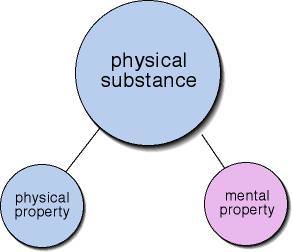4.2: Substance Dualism and Existentialism
- Page ID
- 2764
\( \newcommand{\vecs}[1]{\overset { \scriptstyle \rightharpoonup} {\mathbf{#1}} } \)
\( \newcommand{\vecd}[1]{\overset{-\!-\!\rightharpoonup}{\vphantom{a}\smash {#1}}} \)
\( \newcommand{\dsum}{\displaystyle\sum\limits} \)
\( \newcommand{\dint}{\displaystyle\int\limits} \)
\( \newcommand{\dlim}{\displaystyle\lim\limits} \)
\( \newcommand{\id}{\mathrm{id}}\) \( \newcommand{\Span}{\mathrm{span}}\)
( \newcommand{\kernel}{\mathrm{null}\,}\) \( \newcommand{\range}{\mathrm{range}\,}\)
\( \newcommand{\RealPart}{\mathrm{Re}}\) \( \newcommand{\ImaginaryPart}{\mathrm{Im}}\)
\( \newcommand{\Argument}{\mathrm{Arg}}\) \( \newcommand{\norm}[1]{\| #1 \|}\)
\( \newcommand{\inner}[2]{\langle #1, #2 \rangle}\)
\( \newcommand{\Span}{\mathrm{span}}\)
\( \newcommand{\id}{\mathrm{id}}\)
\( \newcommand{\Span}{\mathrm{span}}\)
\( \newcommand{\kernel}{\mathrm{null}\,}\)
\( \newcommand{\range}{\mathrm{range}\,}\)
\( \newcommand{\RealPart}{\mathrm{Re}}\)
\( \newcommand{\ImaginaryPart}{\mathrm{Im}}\)
\( \newcommand{\Argument}{\mathrm{Arg}}\)
\( \newcommand{\norm}[1]{\| #1 \|}\)
\( \newcommand{\inner}[2]{\langle #1, #2 \rangle}\)
\( \newcommand{\Span}{\mathrm{span}}\) \( \newcommand{\AA}{\unicode[.8,0]{x212B}}\)
\( \newcommand{\vectorA}[1]{\vec{#1}} % arrow\)
\( \newcommand{\vectorAt}[1]{\vec{\text{#1}}} % arrow\)
\( \newcommand{\vectorB}[1]{\overset { \scriptstyle \rightharpoonup} {\mathbf{#1}} } \)
\( \newcommand{\vectorC}[1]{\textbf{#1}} \)
\( \newcommand{\vectorD}[1]{\overrightarrow{#1}} \)
\( \newcommand{\vectorDt}[1]{\overrightarrow{\text{#1}}} \)
\( \newcommand{\vectE}[1]{\overset{-\!-\!\rightharpoonup}{\vphantom{a}\smash{\mathbf {#1}}}} \)
\( \newcommand{\vecs}[1]{\overset { \scriptstyle \rightharpoonup} {\mathbf{#1}} } \)
\(\newcommand{\longvect}{\overrightarrow}\)
\( \newcommand{\vecd}[1]{\overset{-\!-\!\rightharpoonup}{\vphantom{a}\smash {#1}}} \)
\(\newcommand{\avec}{\mathbf a}\) \(\newcommand{\bvec}{\mathbf b}\) \(\newcommand{\cvec}{\mathbf c}\) \(\newcommand{\dvec}{\mathbf d}\) \(\newcommand{\dtil}{\widetilde{\mathbf d}}\) \(\newcommand{\evec}{\mathbf e}\) \(\newcommand{\fvec}{\mathbf f}\) \(\newcommand{\nvec}{\mathbf n}\) \(\newcommand{\pvec}{\mathbf p}\) \(\newcommand{\qvec}{\mathbf q}\) \(\newcommand{\svec}{\mathbf s}\) \(\newcommand{\tvec}{\mathbf t}\) \(\newcommand{\uvec}{\mathbf u}\) \(\newcommand{\vvec}{\mathbf v}\) \(\newcommand{\wvec}{\mathbf w}\) \(\newcommand{\xvec}{\mathbf x}\) \(\newcommand{\yvec}{\mathbf y}\) \(\newcommand{\zvec}{\mathbf z}\) \(\newcommand{\rvec}{\mathbf r}\) \(\newcommand{\mvec}{\mathbf m}\) \(\newcommand{\zerovec}{\mathbf 0}\) \(\newcommand{\onevec}{\mathbf 1}\) \(\newcommand{\real}{\mathbb R}\) \(\newcommand{\twovec}[2]{\left[\begin{array}{r}#1 \\ #2 \end{array}\right]}\) \(\newcommand{\ctwovec}[2]{\left[\begin{array}{c}#1 \\ #2 \end{array}\right]}\) \(\newcommand{\threevec}[3]{\left[\begin{array}{r}#1 \\ #2 \\ #3 \end{array}\right]}\) \(\newcommand{\cthreevec}[3]{\left[\begin{array}{c}#1 \\ #2 \\ #3 \end{array}\right]}\) \(\newcommand{\fourvec}[4]{\left[\begin{array}{r}#1 \\ #2 \\ #3 \\ #4 \end{array}\right]}\) \(\newcommand{\cfourvec}[4]{\left[\begin{array}{c}#1 \\ #2 \\ #3 \\ #4 \end{array}\right]}\) \(\newcommand{\fivevec}[5]{\left[\begin{array}{r}#1 \\ #2 \\ #3 \\ #4 \\ #5 \\ \end{array}\right]}\) \(\newcommand{\cfivevec}[5]{\left[\begin{array}{c}#1 \\ #2 \\ #3 \\ #4 \\ #5 \\ \end{array}\right]}\) \(\newcommand{\mattwo}[4]{\left[\begin{array}{rr}#1 \amp #2 \\ #3 \amp #4 \\ \end{array}\right]}\) \(\newcommand{\laspan}[1]{\text{Span}\{#1\}}\) \(\newcommand{\bcal}{\cal B}\) \(\newcommand{\ccal}{\cal C}\) \(\newcommand{\scal}{\cal S}\) \(\newcommand{\wcal}{\cal W}\) \(\newcommand{\ecal}{\cal E}\) \(\newcommand{\coords}[2]{\left\{#1\right\}_{#2}}\) \(\newcommand{\gray}[1]{\color{gray}{#1}}\) \(\newcommand{\lgray}[1]{\color{lightgray}{#1}}\) \(\newcommand{\rank}{\operatorname{rank}}\) \(\newcommand{\row}{\text{Row}}\) \(\newcommand{\col}{\text{Col}}\) \(\renewcommand{\row}{\text{Row}}\) \(\newcommand{\nul}{\text{Nul}}\) \(\newcommand{\var}{\text{Var}}\) \(\newcommand{\corr}{\text{corr}}\) \(\newcommand{\len}[1]{\left|#1\right|}\) \(\newcommand{\bbar}{\overline{\bvec}}\) \(\newcommand{\bhat}{\widehat{\bvec}}\) \(\newcommand{\bperp}{\bvec^\perp}\) \(\newcommand{\xhat}{\widehat{\xvec}}\) \(\newcommand{\vhat}{\widehat{\vvec}}\) \(\newcommand{\uhat}{\widehat{\uvec}}\) \(\newcommand{\what}{\widehat{\wvec}}\) \(\newcommand{\Sighat}{\widehat{\Sigma}}\) \(\newcommand{\lt}{<}\) \(\newcommand{\gt}{>}\) \(\newcommand{\amp}{&}\) \(\definecolor{fillinmathshade}{gray}{0.9}\)Substance Dualism

In this tradition of dualism both matter and spirit exist and are separate substances: one physical and extended in time and space and the other not so extended.
There are some dualists who claim that there is one reality which is composed of two different substances: physical and spiritual. These two substances are quite different form one another. There are some dualists who claim that there is one reality that has two aspects to every real thing: the physical and mental.
Plato and Dualism
Plato thought that the soul could and would exist apart from the body and would exist after the death of the body. He offered a "proof" for this position and was the first to do so in writing that we have any evidence of doing so. He offered several different proofs or arguments none of which are convincing today. They are held to be specious arguments or terribly flawed and unconvincing. He held that humans were composed of bodies and souls but the soul was more important and immortal. His arguments used premises which we question today. For example, Plato thought that he could conclude that the soul could exist independent of the body because it acted independently from the body when it engaged in pure thought. This is no longer accepted as true since it is equally evident today that without a physical brain thought appears unlikely to occur. Plato thought that the only way to explain how people come to know things is that they are remembering the knowledge implanted in their souls when the souls were in the realm of pure thought and eternal forms before entering into the body after which they forgot as they became confused by physical emotions and feelings and limited experiences through the senses. This is no longer accepted as the best explanation of how people come to have knowledge. None the less, Plato is credited with being the first human to attempt to set out any sort of a proof that humans had souls and that they survived the death of the body and that they were immortal. He offered these arguments in the dialogue he wrote titled the Phaedo.
Descartes and Dualism
Descartes also believed that the soul existed prior to and separate from the body (see Meditation II, of Meditations on First Philosophy) and so was immortal. In his view all of reality consisted of two very different substances: matter or the physical and spirit or the non-physical. The physical was what would be extended in time and space and the non-physical would not be so characterized. For Descartes the soul of a human exists prior to and separate from the body. His proof consisted of argumentation that has been seriously criticized and rejected. He thought that if he could in some form demonstrate that humans can prove that they exist without first proving that they have physical bodies then that would prove that they did not need a physical body in order to exist. He thought that his famous claim that "I think therefore I am" established not just that he existed but that he existed without a body as a "thinking thing". A "thinking thing" is a thing that thinks and by that would be included: imagining, conceiving, hoping, dreaming, desiring, fearing, conjecturing, reasoning, remembering and more. For him a "thinking thing" needed no physical parts to do what it does. Modern science has established that there is no evidence of humans that are without a physical body and its brain. There is no evidence that thought is possible without a brain. There is much evidence that what has been associated with Descartes' "thinking thing" is now explained solely in terms of the brain and how the brain is physically structured and the functioning of the brain.
Now most people born in the west in the 20th Century have acquired the belief in dualism through their culture. It is part of the belief system of the Judaeo-Christian-Islam traditions. It appears to most people as quite obvious. It carries with it however, several major problems. One of them is the division created between the material realm which includes human bodies and brains and the non-material realm or the spiritual realm which would include minds and souls or spirits. In philosophy of mind dualism would be the general position that minds and bodies are distinct substances and so the mind is not physical and not part of the body.
Cartesian Dualism
Existentialism

Existentialism, a philosophical movement or tendency, emphasizing individual existence, freedom, and choice that influenced many diverse writers in the 19th and 20th centuries
The existentialists separated from the debate between the materialists and the idealists. Instead they focused on what humans could know for certain. We know that we exist and that we are aware of that existence. We are aware that there are things that exist that do not appear to be aware and do not have freedom. So there are those things that have that awareness and those that do not.
As the existentialist, Jean-Paul Sartre, categorized real things in two varieties only:
- Being-for-itself is conscious and free
- Being-in-itself is non-conscious.
So for the existentialists there are two types of real things, two types of things that exist: being-for-itself and being-in-itself.
Jean-Paul Sartre Existentialism
There is no proof of souls or spirits or ghosts or deities and thus their existence is nothing other than what people make a decision to believe. People decide whether or not to believe that such entities are real or not and they decide on the criteria for making such decisions. What is given immediately to consciousness is consciousness and through it the awareness of what is not conscious and not free.
Some existentialists hold that such beliefs are and must be beyond reason so that humans must make a leap of faith into the beliefs of the reality of such nonphysical entities. For certain what humans can know is their own existence and the existence of things not like humans because they have no consciousness and are not free.
Henri on Existentialism
Philosophy Applications

Descartes believed that only humans had souls because, among other things, animals can’t reason the way that we do. Some followers of Descartes took this to mean that animals have no mental states at all, not even pain.
1. Does our mental superiority give us the right to use animals as we please? Why or why not?
If mental states are brain states, then by scanning your brain, we should be able to know what you are thinking. Suppose we had a brain scanner that could reliably tell whether someone was lying.
2. Should we make everyone wear one of those devices when they take the witness stand? Why or why not?
Suppose you fell in love with someone who seemed to be the most intelligent, witty, and caring person you’ve ever met. Now suppose that “person” turns out to be an android.
3. Would you conclude that he or she doesn’t have a mind/soul? Why or why not?
4. Would you still love him or her? Why or why not?
Vocabulary
Vocabulary Quizlet 4.2

